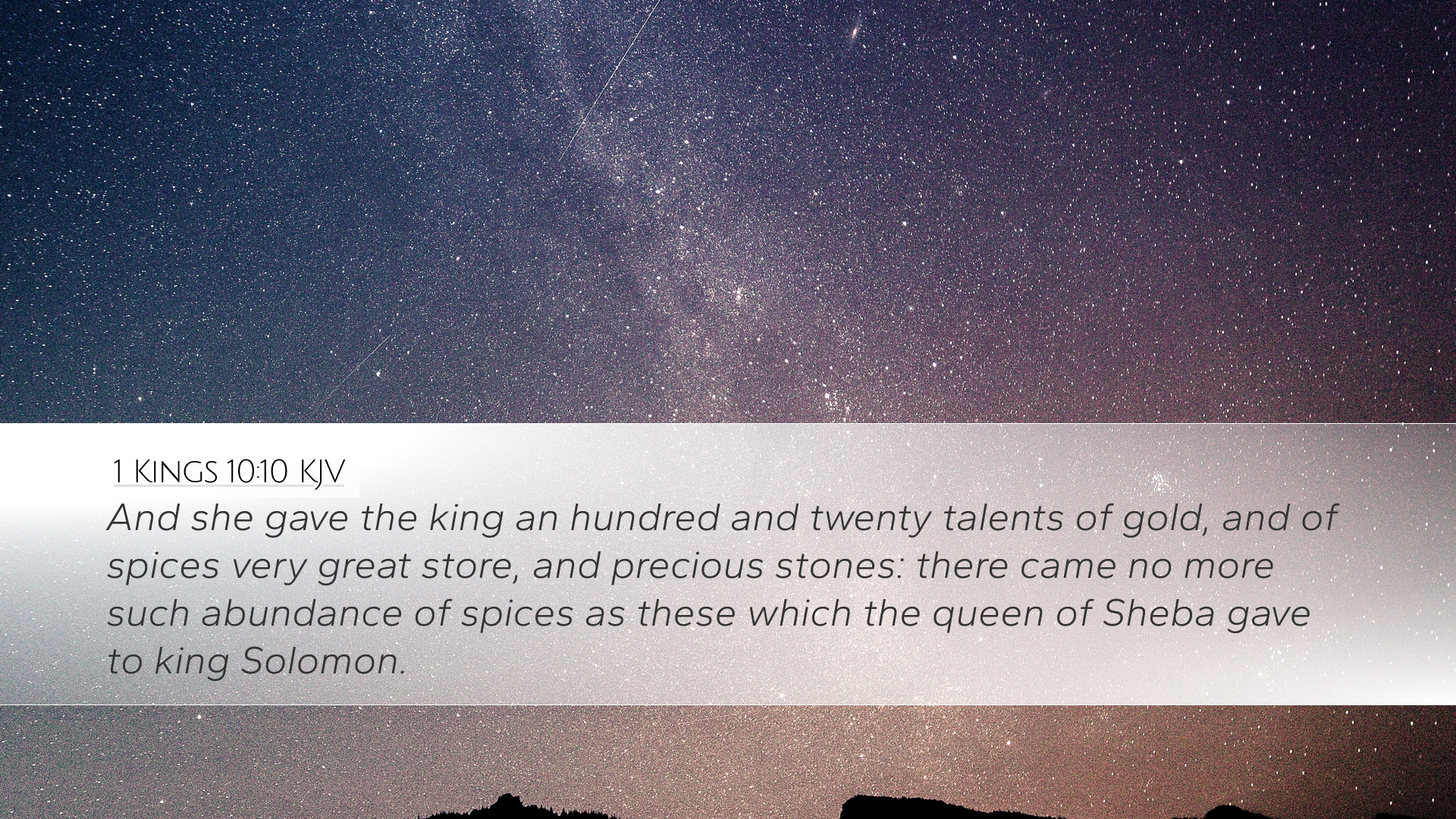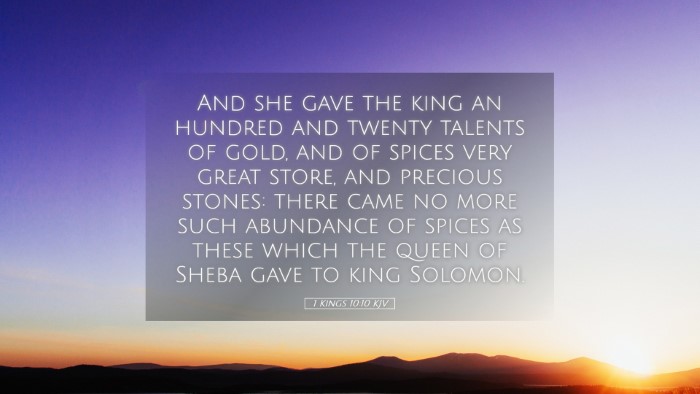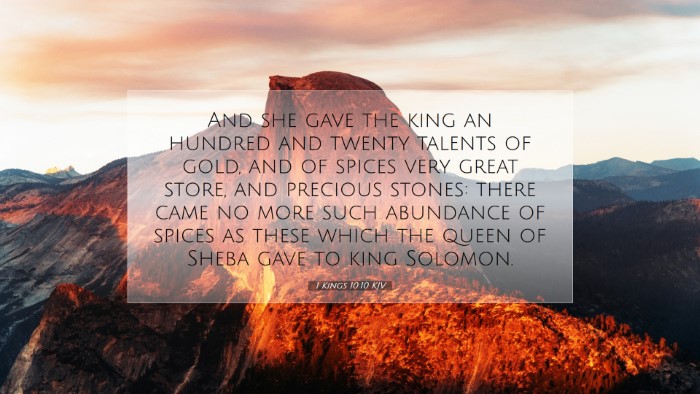Commentary on 1 Kings 10:10
1 Kings 10:10 recounts the significant moment when the Queen of Sheba visits King Solomon and brings with her spices, gold, and precious stones, demonstrating the wealth that he had garnered through his wisdom and the favor of God. The verse reads:
"And she gave the king an hundred and twenty talents of gold, and of spices very great store, and precious stones: there came no more such abundance of spices as these which the queen of Sheba gave to king Solomon." (1 Kings 10:10, KJV)
Insights from Public Domain Commentaries
Matthew Henry's Commentary
Matthew Henry emphasizes the providence of God in bringing the Queen of Sheba to Solomon. He points out that her visit reflects the drawing of nations to the light of wisdom that resides in Solomon, who was known for his unparalleled wisdom granted by God. The gifts of gold and spices are seen as a tribute to the king's wisdom and wealth, showcasing the recognition of God's blessings upon him.
- Gifts of Gold: The 120 talents mentioned are indicative of a vast wealth, estimated to be around four tons of gold, which symbolizes the wealth of nations being attracted to the wisdom and splendor of God's chosen leader.
- Spices and Precious Stones: These items represent both material wealth and the rare treasures of understanding and knowledge that were synonymous with Solomon’s reign. The abundance of spices demonstrates the flourishing trade and the richness of the land during Solomon’s rule.
Henry further notes that the Queen’s gifts are more than mere diplomatic tributes; they symbolize a recognition of God’s favor and the universal longing for truth and wisdom, which ultimately points to Jesus Christ as the greater Solomon.
Albert Barnes' Notes on the Bible
Albert Barnes offers a thorough exploration of the significance of the Queen of Sheba's gifts. He delves into the implication that her gifts were an expression of admiration not just for Solomon but for the God who endowed him with wisdom. The quantity and quality of the gifts indicate a formal acknowledgment of Solomon's greatness.
- Historical Context: Barnes highlights that this meeting symbolizes a pivotal moment in Israel's foreign relations, where wisdom attracts wealth and respect. The Queen’s gifts and the intention behind them reflect the age's trade dynamics, particularly the opulence of Arabia and its interaction with Israel.
- Symbolism of Spices: The spices, often used in religious rituals and for preserving, are symbolic of the divine presence and the holiness of God. This notion supports the idea of Solomon's temple as a place where heaven meets earth.
Additionally, Barnes connects this passage to prophetic visions of nations coming to worship the true God, suggesting that the visit of the Queen is a foretaste of the future hope represented in the Gospel, where all nations would seek wisdom from Christ.
Adam Clarke's Commentary
Adam Clarke presents a scholarly analysis of the various traditional interpretations of the gifts given by the Queen of Sheba. He notes the historical richness of the verse, providing details about the measurement of the talents (ancient weight measures) and the implications of such quantities.
- Significance of the Gifts: Clarke posits that the "hundred and twenty talents of gold" signifies not only the wealth of Sheba but also its acknowledgment of Solomon's God-given wisdom. The extravagant gifts reveal the respect and reverence that rulers had towards the wise king of Israel.
- Impact of the Visit: He observes that the visit underscores the yearning of distant nations to find true wisdom and understanding, drawing a parallel to the global implications of the Gospel call.
Clarke goes on to emphasize how this moment serves as a vital historical account that illustrates God's plan of drawing all peoples to Himself, with Solomon as a type of Christ, whose wisdom and glory are to be known by all nations.
Theological Reflections
The visit of the Queen of Sheba encapsulates critical theological themes relevant for pastors, students, and theologians alike:
- The universality of God's wisdom: This narrative shows that God's wisdom is not confined within geographical boundaries but is sought after by all who yearn for truth.
- Christ as the Fulfillment: The themes of wisdom, leadership, and nations turning to the true God culminate in the person of Christ, who embodies the ultimate expression of divine wisdom.
- Wealth and Spirituality: The gifts emphasize that material wealth can be used for sacred purposes, directing attention to both the physical and spiritual blessings that come from God.
Conclusion
1 Kings 10:10 serves as a rich source for understanding the interplay between divine wisdom, human recognition, and the worship of the true God. The insights gleaned from the commentaries of Matthew Henry, Albert Barnes, and Adam Clarke provide a multifaceted view of the passage, encouraging deeper reflection on the broader implications of wisdom, leadership, and divine favor in the life of the believer and the church today.


